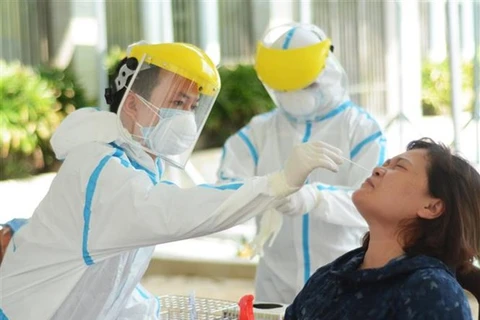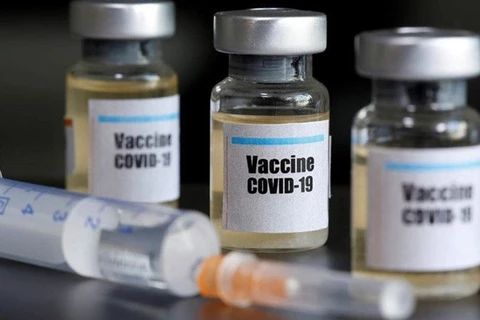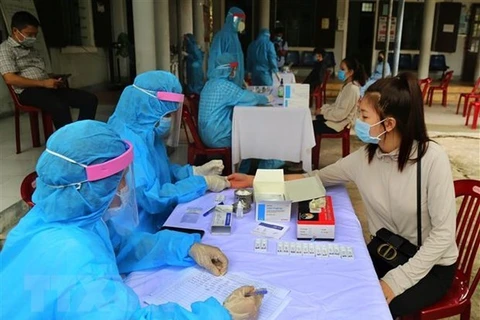 Currently, there are more than 50 hospitals and institutes across Vietnam eligible for conducting COVID-19 tests (Photo: VNA)
Currently, there are more than 50 hospitals and institutes across Vietnam eligible for conducting COVID-19 tests (Photo: VNA) Hanoi (VNA) - Expanding COVID-19 testing is one of four key measures that played a decisive role in treating the disease caused by the coronavirus SARS-CoV-2 in Vietnam, said a top health official.
Associate Professor Luong Ngoc Khue, Director of the Medical Examination and Treatment Administration under the Health Ministry, said at a meeting last week that until now, there are more than 50 hospitals and institutes across the country eligible for conducting COVID-19 tests.
When the pandemic was first reported in the country, only three units were allowed to offer the tests.
With the expansion of the testing network, hospitals were more active in testing, thus helped save time for patients and reduced the burden on the preventive medicine sector in testing at-risk people.
At the meeting on reviewing COVID-19 treatment and mapping out new tasks, Khue, who is also Deputy Head of the Treatment Subcommittee under the National Steering Committee for COVID-19 Prevention and Control, pointed out drastic measures that contributed to their achievements in COVID-19 treatment.
First, Khue mentioned a reasonable patient allocation based on their health conditions. Accordingly, critically-ill patients are treated at central hospitals while healthcare centres and hospitals at lower levels – communes, districts and provinces – would deal with other patients.
Secondly, Vietnam has been regularly updating diagnostic and treatment guidelines as recommended by the World Health Organisation or treatment experience of countries around the world.
The country has issued four protocols on COVID-19 diagnosis and treatment. It also considered and implemented different treatment methods including the use of antiviral and anti-malarial drugs, as well as convalescent plasma therapy. Specific healthcare guidelines were developed, for example, those for people with chronic diseases, people with disabilities and 37 criteria for safe hospitals amid the COVID-19 pandemic.
Another effective measure is the establishment of the centre for management and administration to support professional diagnosis and treatment of COVID-19 patients, Khue said.
The centre regularly organises online conferences and invites leading professors across the country to consult on serious cases, discuss optimal treatment methods for patients and share treatment and care experience.
Moreover, hundreds of mobile teams to provide direct support to local-level hospitals that provide treatment for COVID-19 patients were also established nationwide.
The health official also applauded the effective coordination between the system of health facilities across the country in implementing various COVID-19 prevention and control solutions, as well as the active nature and willingness of medical staff in their treatment of COVID-19 patients.
Associate Professor, Dr. Nguyen Truong Son, Deputy Minister of Health and Head of the Treatment Subcommittee, praised the sub-committee in deploying appropriate solutions with access to advanced experience from across the world while focusing their highest efforts on treating their patients.
“Such active participation has helped bring about success in the COVID-19 treatment regimen in Vietnam, as shown by impressive indicators such as up to 96.4 percent of COVID-19 patients in the country having recovered, including severely ill patients with co-morbidities, while minimising the death rate and limiting the rate of cross-infection in medical examination and treatment establishments,” he said.
As the pandemic was still developing around the world, while commercial flights have been reopened, experts also warned of the risk of COVID-19’s resurgence in Vietnam.
Hospitals and the system of medical examination and treatment facilities are suggested to clearly define risk and maintain vigilance, while continuing to thoroughly apply and improve prevention and control activities toward an immediate response to any further outbreaks./.
VNA
























